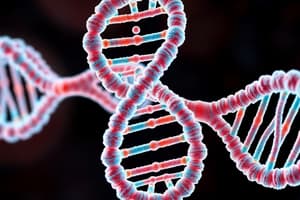Podcast
Questions and Answers
What are genes?
What are genes?
- Sections of RNA that carry out cellular communication
- Proteins that control cellular division
- Segments of DNA that contain instructions for making proteins (correct)
- Structures in the cell that produce genetic mutations
What can cause gene mutations?
What can cause gene mutations?
- Excessive protein intake
- Regular exercise
- Spontaneous errors during cell division (correct)
- Drinking water
How do point mutations differ from chromosomal abnormalities?
How do point mutations differ from chromosomal abnormalities?
- Point mutations involve changes in the overall structure of a gene
- Chromosomal abnormalities result in overall duplication of genes
- Chromosomal abnormalities involve single nucleotide changes
- Point mutations lead to new amino acids in proteins (correct)
What happens when genes are translocated between different chromosomes?
What happens when genes are translocated between different chromosomes?
How do gene mutations relate to diseases like cystic fibrosis and sickle cell anemia?
How do gene mutations relate to diseases like cystic fibrosis and sickle cell anemia?
In what way can gene mutations provide evolutionary advantages over time?
In what way can gene mutations provide evolutionary advantages over time?
Why is understanding gene mutations important?
Why is understanding gene mutations important?
Which gene mutation is associated with an elevated risk of breast cancer?
Which gene mutation is associated with an elevated risk of breast cancer?
What can happen due to a specific genetic mutation in Huntington's disease?
What can happen due to a specific genetic mutation in Huntington's disease?
How do certain gene mutations impact individuals according to the text?
How do certain gene mutations impact individuals according to the text?
What are some medical applications of studying gene mutations mentioned in the text?
What are some medical applications of studying gene mutations mentioned in the text?
What are CRISPR/Cas9 tools promising in terms of gene mutations?
What are CRISPR/Cas9 tools promising in terms of gene mutations?
Flashcards are hidden until you start studying
Study Notes
Gene Mutations
Genetic information is stored in DNA molecules within cells, which carry the instructions used by our bodies to grow, function, and reproduce. Genes are segments of DNA that contain the directions for how proteins are made; these proteins help control most processes within our cells, from growth and division to communication with other cells. When there's change in this genetic material causing variations in the instructions, we call it a gene mutation.
Gene mutations can have several origins, such as spontaneous errors during cell division, exposure to radiation or toxic chemicals, or inherited changes passed down through families. These alterations may cause various health issues if they affect critical genes, leading to diseases like cystic fibrosis and sickle cell anemia. In some cases, however, gene mutations actually improve an organism's ability to adapt its environment, providing evolutionary advantages over time.
There are two main types of gene mutations: point mutations and chromosomal abnormalities. Point mutations involve single nucleotide changes while retaining the overall structure of a gene, often resulting in new amino acids being incorporated into proteins. Chromosomal abnormalities occur when whole sections of genes get deleted, rearranged, duplicated, or translocated between different chromosomes. While some mutations might not impact the functioning of the protein product, others could lead to detrimental effects such as loss of protein function, gain of novel functions, increased sensitivity to external signals, and more.
Understanding gene mutations is important because they play crucial roles in human development, aging, and disease. For example, the BRCA1 gene influences breast cancer risk, and individuals who inherit certain BRCA1 mutations face an elevated likelihood of developing the disease. Likewise, Huntington's disease results from a specific genetic mutation where certain brain cells die at an early age due to the accumulation of altered huntingtin protein.
The study of gene mutations has significant implications for medical applications, including prenatal testing methods like chorionic villus sampling or amniocentesis for pregnant women carrying fetuses potentially affected by genetic disorders. This allows parents to make informed decisions regarding their pregnancy and seek appropriate support services before birth. Furthermore, advances in genome editing tools like CRISPR/Cas9 promise therapeutic potential for treating many genetic conditions, offering hope to those suffering from debilitating diseases caused by faulty genes.
Studying That Suits You
Use AI to generate personalized quizzes and flashcards to suit your learning preferences.




